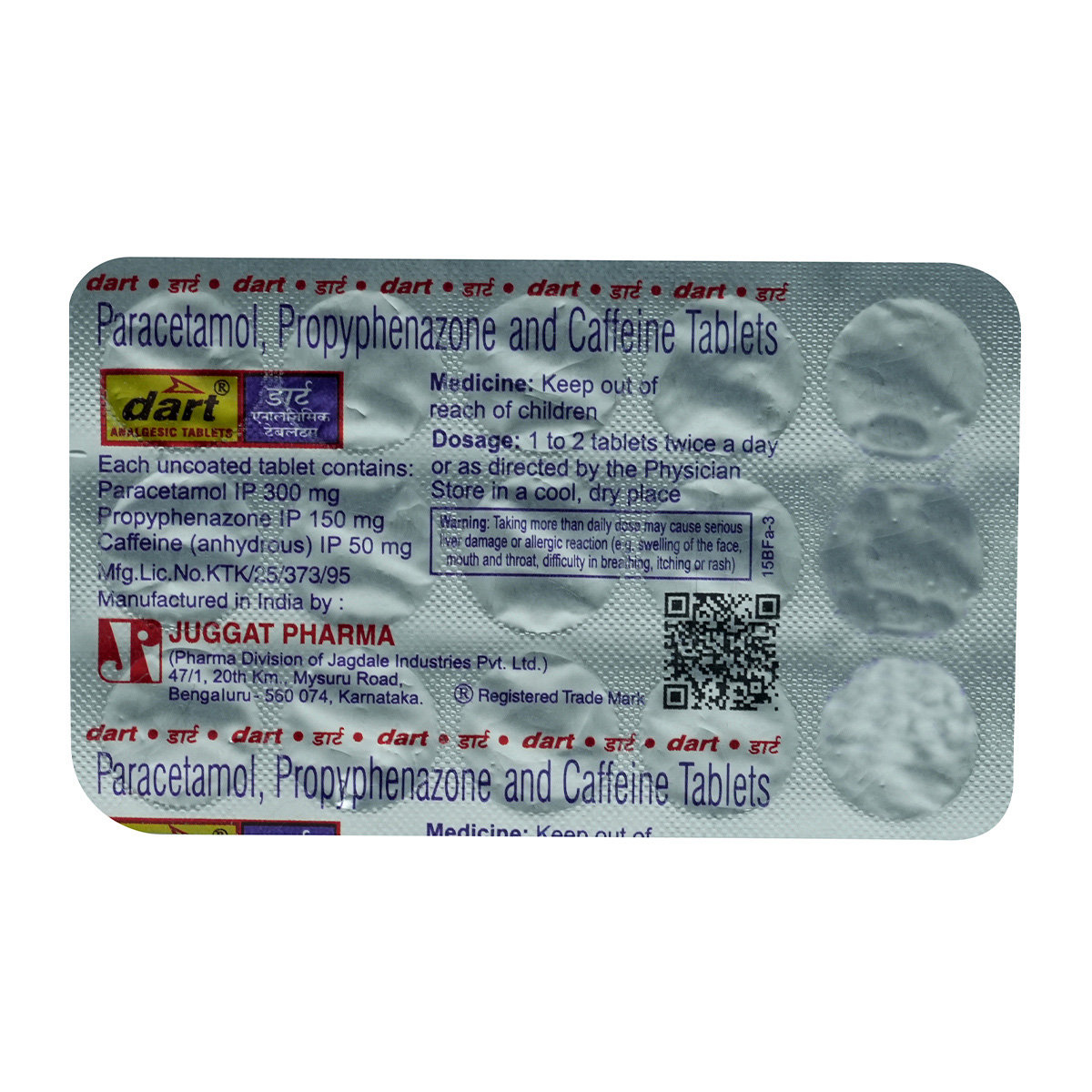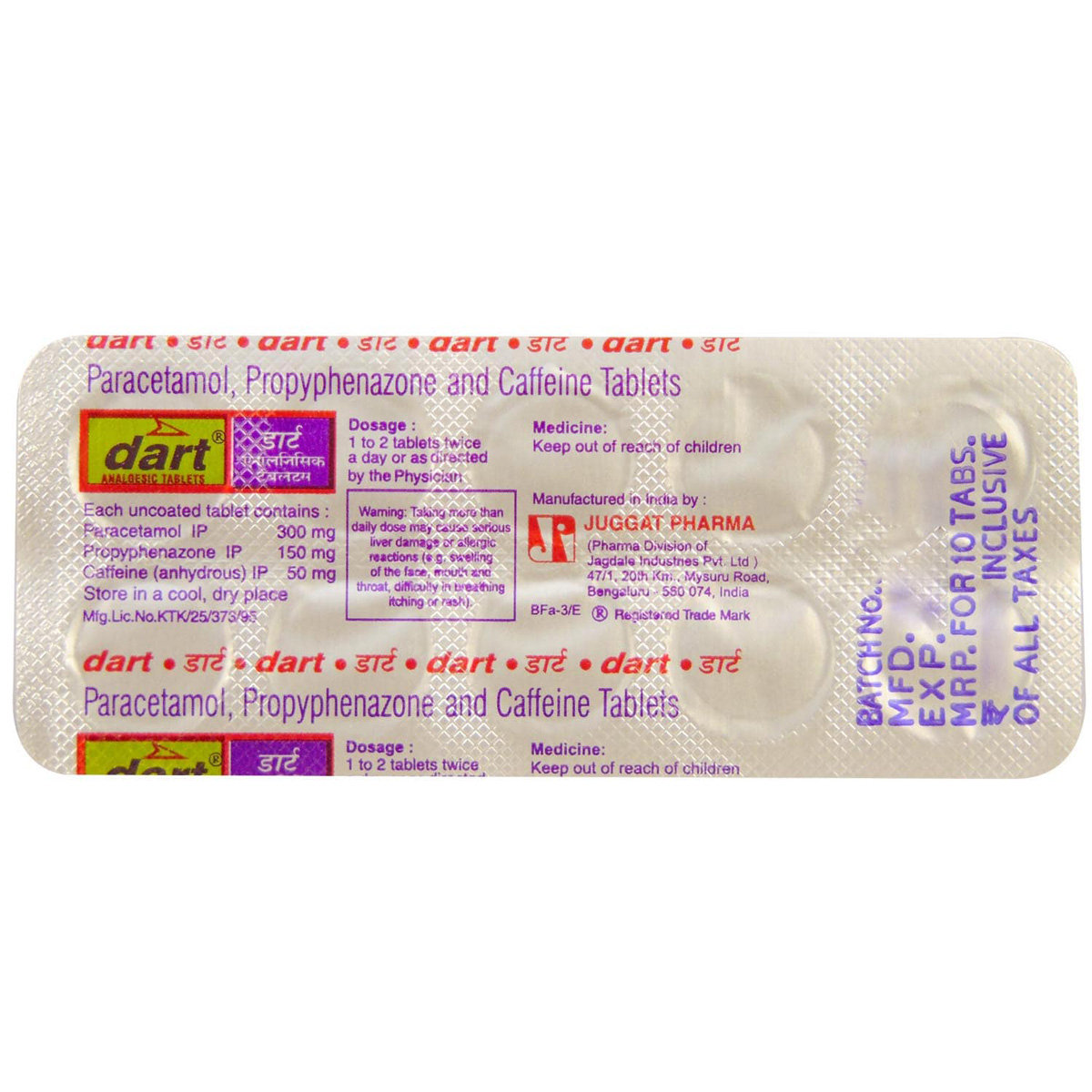Paracetamol+caffeine+propyphenazone
About Paracetamol+caffeine+propyphenazone
Paracetamol+caffeine+propyphenazone belongs to a class of painkillers called non-steroidal anti-inflammatory drugs (NSAIDs). Pain can be temporary (acute) or long-lasting (chronic) in nature. Acute pain is for a short time caused by damage to the tissues of the muscle, bone, or other organs. While, chronic pain lasts for a long duration and is caused due to pathologies like nerve damage, osteoarthritis etc. Besides this, it is also useful for dental pain which can occur due to damage to the tooth nerve, infection, decay, extraction, or injury.
Paracetamol+caffeine+propyphenazone is composed of Propyphenazone, Paracetamol, and Caffeine. Together it relieves symptoms of arthritis, and dysmenorrhea (painful periods or menstrual cramps), and reduces fever. Propyphenazone and paracetamol are known to have analgesic and antipyretic effects for reducing mild to moderate pain. They work by lowering the elevated body temperature and mild pain by inhibiting the synthesis of a chemical messenger (prostaglandin) and by promoting heat loss (through sweating) that helps reset the hypothalamic thermostat. Caffeine acts as a common stimulant by narrowing the blood vessels and reducing headaches.
Take it as advised by your healthcare provider. If stomach upset or irritation occurs, it is advisable to take Paracetamol+caffeine+propyphenazone with food or milk. It should be swallowed whole with a glass of water. Do not crush or chew the tablets. Like all medicines, Paracetamol+caffeine+propyphenazone may cause side effects, although not everybody gets them. Stop taking this medicine if you experience symptoms like tightness of the chest, breathing difficulties, fever, skin rashes, increased heart rate and or in case of any signs of hypersensitivity.
Do not take Paracetamol+caffeine+propyphenazone if you are allergic to painkillers like aspirin, paracetamol, naproxen, or diclofenac. It is not recommended for use in children, people with liver disease, heart disease, or gastric ulcers/bleeding problems. Paracetamol+caffeine+propyphenazone may be associated with a small increase in the risk of heart attack (myocardial infarction). Avoid the consumption of alcohol as it may damage your liver and cause increased side effects from taking the drug. Consult your doctor if your symptoms of pain, inflammation, and fever do not disappear even after ten days.
Uses of Paracetamol+caffeine+propyphenazone
Medicinal Benefits
Paracetamol+caffeine+propyphenazone is composed of propyphenazone, caffeine and paracetamol primarily used to treat mild to moderate pain. Paracetamol+caffeine+propyphenazone treats pain and relief from discomfort caused by conditions like tooth pain, arthritis, period pain and another type of short-term pains. It helps in treating pain by blocking the chemical messenger in the brain responsible for causing pain. Propyphenazone and Paracetamol lower the elevated body temperature and mild pain by inhibiting the synthesis of prostaglandin by promoting heat loss (through sweating) that helps reset the hypothalamic thermostat and caffeine helps in reducing drowsiness caused due to paracetamol. Caffeine acts as a common stimulant by narrowing the blood vessels and reducing headaches. Paracetamol has got the advantage of producing less gastric irritation compared to other painkillers like aspirin.
Directions for Use
Storage
Side Effects of Paracetamol+caffeine+propyphenazone
- Nausea
- Indigestion
- Stomach pain
- Restlessness
Drug Warnings
Alcohol intake should be avoided with Paracetamol+caffeine+propyphenazone as it may lead to unpleasant side effects (dizziness, weakness, drowsiness). It is not recommended for children, severe liver/kidney-related ailments, or pregnant women. Regular monitoring of kidney function may be advised by the doctor in such cases. Elderly patients should exercise extreme caution while using Paracetamol+caffeine+propyphenazone as the probability of occurrence of side effects in such patients is higher. Caffeine can pass in the breast milk which may have a stimulating effect on the breastfed child. Please seek medical advice if you are pregnant or breastfeeding.
Drug Interactions
Drug-Drug interaction: Paracetamol+caffeine+propyphenazone interacts with anti-nausea pills (metoclopramide), an antidepressant (barbiturates), antiepileptics (carbamazepine, hydantoins), antibiotics (rifampicin), local anaesthetics (prilocaine), and anti-arthritis agents (sulfinpyrazone).
Drug-Food Interaction: Intake of alcohol along with Paracetamol+caffeine+propyphenazone should be avoided as it can lead to liver damage.
Drug-Disease Interaction: Paracetamol+caffeine+propyphenazone is not recommended for people having bleeding disorders, like haemophilia, von Willebrand disease, or low blood platelets. Besides this, it should not be given to patients suffering from influenza (flu) or chickenpox. It should also be avoided in case of the presence of gastric or duodenal ulcers.
Drug-Drug Interactions Checker List:
Safety Advice

Alcohol
cautionTaking Paracetamol+caffeine+propyphenazone with alcohol may cause dizziness or drowsiness. Besides this, it can also damage your liver if taken for a longer duration. So, avoid or limit intake of alcoholic beverages with Paracetamol+caffeine+propyphenazone.

Pregnancy
unsafeUse of Paracetamol+caffeine+propyphenazone during pregnancy is not recommended as taking this medicine during the last 3 months of pregnancy may harm the unborn baby

Breast Feeding
cautionParacetamol+caffeine+propyphenazone is known to pass through milk in some amount. So, it should be taken with caution if you are breastfeeding. Take Paracetamol+caffeine+propyphenazone only if prescribed by your doctor.

Driving
unsafeAfter taking Paracetamol+caffeine+propyphenazone you may notice dizziness, sleepiness, drowsiness or fatigue as it contains paracetamol which causes sedation. So, in this, you should stop taking Paracetamol+caffeine+propyphenazone and contact your doctor.

Liver
cautionParacetamol+caffeine+propyphenazone to be taken with caution, especially if you have a history of liver disease. The dose may have to be adjusted by your doctor.

Kidney
cautionParacetamol+caffeine+propyphenazone to be taken with caution, especially if you have a history of Kidney diseases/conditions. The dose may have to be adjusted by your doctor.

Children
cautionParacetamol+caffeine+propyphenazone is contraindicated in children younger than 12 years of age. It may cause kidney problems in children and adolescents who are dehydrated.
Habit Forming
Diet & Lifestyle Advise
- Include more glucosamine, chondroitin sulphate, vitamin D, and calcium-enriched supplements. Besides this, turmeric and fish oils can help in reducing inflammation in the tissue.
- Do not go for heavy exercise as it may increase your headache. Instead, you can do stretching and yoga which will help to feel fresh.
- Your sitting posture is important especially when you have pain and inflammation. Try to sit as little as possible, and only for a short duration of time.
- Long-term immobility is harmful in conditions like arthritis.
- Use back support like a rolled-up towel at the back of your spine curve to minimize pain.
- Keep your knees and hips at a right angle. Besides this, you can also use a footrest if required.
Patients Concern
Disease/Condition Glossary
Pain: It can be short-term (acute) or long-term (chronic) in nature. Acute pain is for a short time caused by damage to the tissues of the muscle, bone, or organs. While, chronic pain lasts for a longer duration and is caused due to pathologies like nerve damage, osteoarthritis, and dental pain due to damage to the tooth nerve, infection, decay, extraction, or injury. Many women have painful periods known as dysmenorrhea most often menstrual cramps. On the other hand, Osteoarthritis is a degenerative disease that results in chronic pain in joints (especially the knee) and stiffness making daily tasks difficult.
FAQs
Paracetamol+caffeine+propyphenazone is known to be contraindicated in patients allergic to painkillers (NSAIDs) or any of the components or excipients of this medicine. Its use should also be avoided in patients with a history of heart failure, high blood pressure, stomach ulcer and kidney/liver disease.
Paracetamol+caffeine+propyphenazone should not be taken as a long term medication as it may lead to stomach ulcers/bleeding and kidney problems. For best results of Paracetamol+caffeine+propyphenazone, take it in doses and duration mentioned by your doctor.
Paracetamol+caffeine+propyphenazone may cause dizziness. If you feel dizzy, please take a rest and also avoid driving while you take Paracetamol+caffeine+propyphenazone as it can be harmful.
This medicine is not indicated for stomach pain. Also, If you have stomach pain post-ingestion it may be a sign of stomach ulcer or gastric bleeding. It is better to inform your doctor in case of stomach pain post-ingestion of this medication.
Taking excessive alcohol with Paracetamol+caffeine+propyphenazone can cause liver damage. So, it is advisable to avoid or limit the intake of alcohol during the treatment with Paracetamol+caffeine+propyphenazone.



